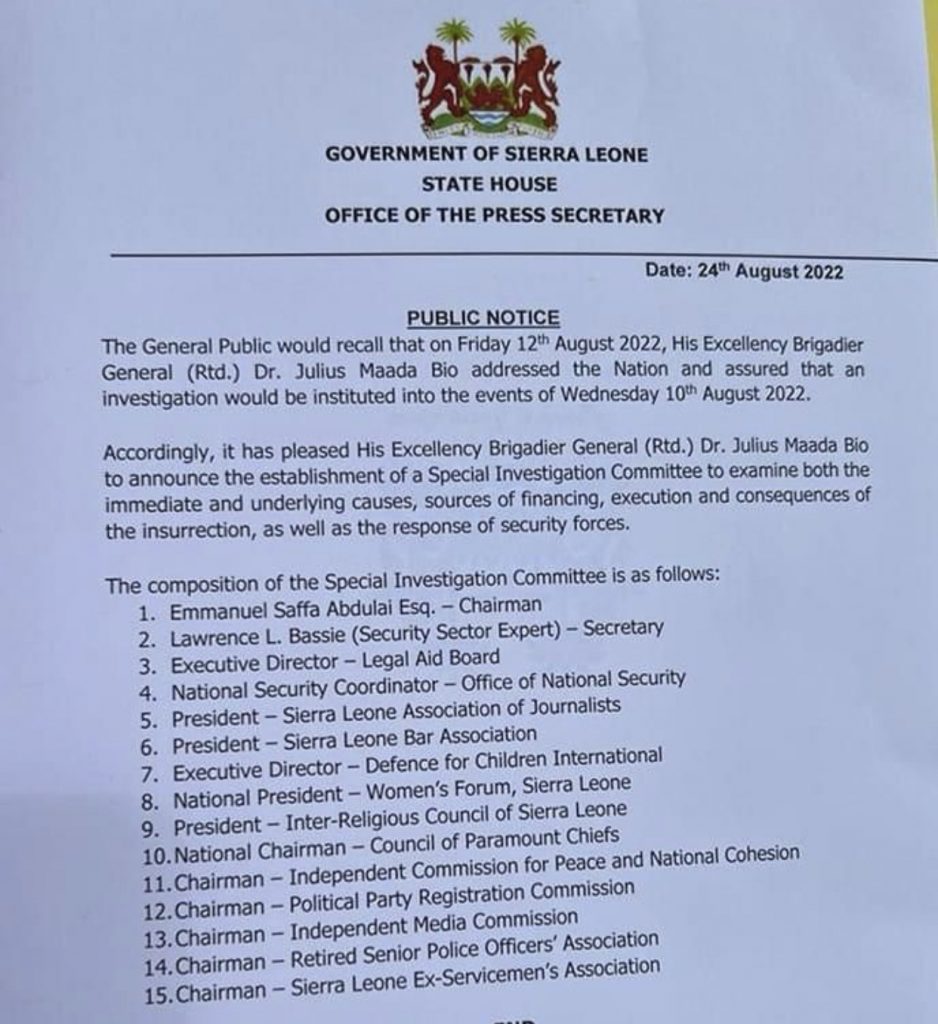On August 24, the President’s office announced the establishment of a “Special Investigation Committee to examine both the immediate and underlying causes, sources of financing, execution and consequences of the insurrection, as well as the response of the security forces”. While many people, local and international human rights organisations have been calling for a full investigation, this was certainly not what was hoped for, except for those who have swallowed the government’s “terrorist” and “insurrection” narrative. This characterisation of events and the language that is supposed to give hope for justice and pave a path for resolution is raising more questions than answers and renders the work of the committee even more herculean.
Does this announcement prejudice the outcome of an investigation that is meant to be open and impartial? Could the report of the committee validate the government’s position that this was in fact an insurrection and not a protest? At this stage, we do not know the terms of reference of the committee. And it is unclear when the committee is expected to complete their work. What we can read from the enduring government narrative and the tone of the statement announcing the committee is that it has its own thoughts and is trying hard to validate them.
If the above issues are not concerning to you, then take a cursory look at the composition of the committee. For example, why would the government want to pack the committee with heads of institutions that are either appointed by the President or answerable to the Executive? Let us say we give them the benefit of doubt, but wonder for a second why a matter between state and citizens will be investigated by state institutions and interested parties?
We have also followed with keen interest statements from some of the entities that make up the committee and wonder how independent and impartial they would be in meeting the demands of this task. For example, the Bar Association’s press release of August 11, categorised the protest as “unlawful demonstration and alleged attempt at an unconstitutional change of the legitimate government of Sierra Leone”. This sounds much more like beating the drums of ‘treason’ charges against the protesters – a position that seems to reinforce the state’s narrative of the August 10 event which they are trying to shove down our throats.
You also wonder how independent and impartial the Chairpersons of the Retired Senior Police Officers’ Association and the Sierra Leone Ex-Servicemen’s Association will be in a matter investigating the brutal death of some of their own. It is no secret that the history of the Sierra Leone police is replete with violent, brutal, and deadly suppression of protests. Will they be so willing to turn the searchlight inwards in a quest to understand the underlying causes of this incident or will their emotions have the better of them?
The incidents of August 10 deserve an independent and impartial investigation. Everyone seems to agree on that. Such a committee must be led by institutions and, or individuals with no ties to the Executive and whose positions are not perceived as biased and compromising. Not least when some of these individuals and organisations that the President has appointed have made clearly biased and prejudicial statements on the matter. You cannot independently and impartially investigate a matter that you already hold an opinion on. This is an important and delicate task. Public perception is vital in the successful delivery of this national assignment.
It is important to reiterate that since the protests erupted, the government has maintained a rather bellicose approach which they do not seem willing to let go of. We have seen little attention paid to the many civilians who lost their lives on that day. While the President and some high-ranking government officials were attending a funeral ceremony of the six police officers killed during the protests, family members of civilians that died during the same incidents were asked to go to the mortuary to identify their loved ones. We are not invoking whataboutism here, but is the government’s message intended to be read as it is Okay to kill civilians because they are less Sierra Leonean or what Mark Curtis calls ‘unpeople’? With reports of disappearances and extrajudicial killings of individuals suspected of involvement in the protests, you wonder how many people will be courageous enough to show up at the mortuary for their loved ones. What can be more painful?
Fear, hate and division have replaced love and unity in moments that demand our collective response and solidarity. The state has essentially presented itself as the victim and it is trying hard to commodify that “victimhood” in exchange for political dividends–a very risky calculation. The protesters, including those who have been killed and the others in detention have been portrayed as the culprits and ‘opposition elements’ that deserve no sympathy. As we have always noted in our commentary on this issue, this stance does not only risk antagonizing and alienating a large section of the population, but also has the propensity of criminalizing dissent, exacerbating tension, and sharpening the toxic divide and polarisation.
At this critical moment in Sierra Leone’s democratic dispensation, the ‘insurrection investigation committee’ carries the burden to surprise the sceptics. The beginning of that process is to free itself from the government’s narrative and the trap of prejudice that has been dug by the State. Secondly, they have to ensure that their work is guided by the desire for fairness, justice, and accountability. As a nation traumatized by the events of August 10 places its faith on a15-person committee, it is hoped that for once, they can rise to the occasion and reaffirm our commitment to the “land that we love Sierra Leone”. The wrong side of history is not a pleasant place to be.
Whatever you are up to this weekend, make it a peaceful and enjoyable experience.


